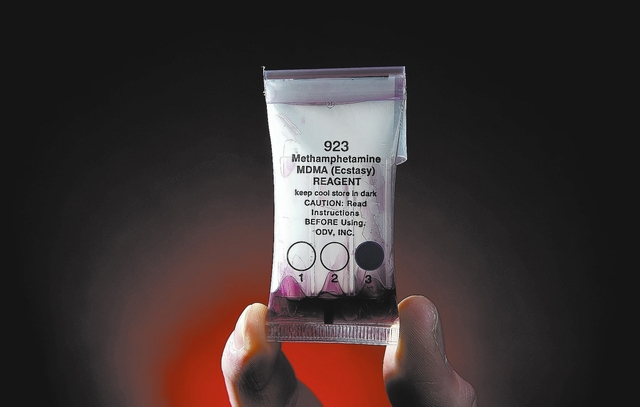COMMENTARY: The use of unreliable field drug tests to leverage guilty pleas from vulnerable Clark County defendants who might be innocent should trouble everyone, including Metro police and the district attorney
In October, the Review-Journal reported on the widespread use of unchallenged field drug tests to secure countless convictions in Clark County since the 1990s.
Police on the street have employed the tests to determine whether seized substances are illegal drugs. The testing entails placing suspected substances in chemical packets to ascertain if color changes indicate they are contraband.
The tests are, however, notoriously unreliable, producing false-positive and false-negative results in significant numbers. The Las Vegas Metropolitan Police Department stated in 2010 it wanted to abandon use of kits designed to flag methamphetamine and cocaine, and in 2014 admitted there was a problem with false-positives that might lead to wrongful convictions. This admission was consistent with a U.S. Justice Department recommendation that field testing not be used in prosecutions without laboratory test validations.
Despite this, Metro still employs the tests and has expanded their use to detect heroin. Of approximately 5,000 local drug arrests and 4,600 convictions in 2015, about 75 percent relied on field test results, typically with no backup verification. While it is impossible to determine how often tests were wrong, or how many innocent people agreed to damaging plea deals, there doubtless have been miscarriages of justice due to testing flaws. The precise numbers are unknowable because the department destroys evidence once drug cases are pled out.
This is disturbing, because those arrested based on field tests are disproportionately poor and of color, can’t afford bail, and face the choice of languishing in jail waiting for a court date and for Metro to do lab testing, or of pleading guilty even if they are innocent. By demanding a hearing, these defendants often jeopardize their housing and employment. Nobody should have to make such difficult decisions absent reliable lab test results.
When pressed, the chief judge of Las Vegas Justice Court said he knew about the faulty tests, but suggested the court would wait for someone to challenge them before engaging the issue. Taking judicial notice of their unreliability is thus unlikely. The public defender’s office, flooded with cases, indicated it was concerned about the problem, but believed pushing back would harm clients. Meanwhile, the private criminal defense bar seems to have largely missed or not addressed this affront to constitutional values.
The district attorney hasn’t helped, stating in a radio interview that reporters are entitled to their opinions about field tests and his prosecutors are entitled to theirs, ignoring the fact that the Justice Department and Metro have admitted their unreliability. He added that defendants could litigate the reliability issue on a case-by-case basis, discounting the burden that would place on a public defender’s office already struggling with intolerably heavy caseloads and an entire court system under severe stress.
The head of the district attorney’s new Conviction Integrity Unit was as unhelpful, challenging defense lawyers to inform him about wrongful convictions based upon faulty field tests, which is impossible when exculpatory evidence has been routinely destroyed. The public defender’s office responded by stressing that it is up to prosecutors to guarantee cases are handled properly, while criminal defense bar representatives insisted they would do something, but weren’t sure what. Little here promises impending change.
This mess reveals deep dysfunction in our criminal justice system, making plain how much work remains to eradicate the class- and race-based inequities plaguing it.
We should start by enacting laws or establishing local rules requiring that anyone charged with drug offenses based on field tests, who isn’t also charged with non-drug offenses justifying bail, must be released within 72 hours unless prosecutors produce certified lab results validating the field results.
There is also ample reason for the Nevada Supreme Court, which in 2008 established performance standards for public defenders meant to assure adequate representation for their clients, to revisit its decision to forego imposing caseload limits on those lawyers. The field test saga suggests the current crush of cases may be too much to overcome, no matter the good intentions of public defenders who want to challenge questionable police and prosecutorial practices.
Using unreliable field drug tests to leverage guilty pleas from vulnerable defendants who might be innocent should trouble everyone committed to a criminal justice system that is fair and constitutionally sound. That includes guardians of the system for whom such values brought them to their jobs. We owe them our gratitude, but also expect that the system they inhabit will produce real justice.
Allen Lichtenstein is a civil liberties and civil rights attorney in Nevada and a member of the Metro Multicultural Affairs Committee. Gary Peck is a longtime civil liberties and civil rights advocate in Nevada and a former member of the Nevada Supreme Court Commission On Indigent Defense and the Metro Multicultural Affairs Committee

















